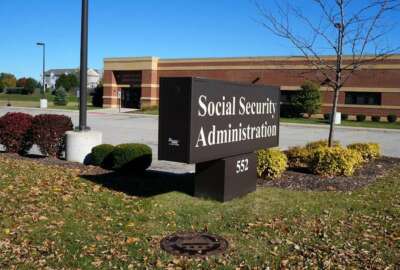SSA hires retired staff to manage crowds at field offices as in-person service ramps up
SSA leadership anticipates higher than normal wait times for customers seeking assistance for at least the first month of the agency opening its doors to walk-in...
The Social Security Administration remains on track to bring most of its employees back into the office on March 30, and plans to increase in-person service to the public, including walk-in service to customers without an appointment, starting in early April.
SSA leadership, however, anticipates higher than normal wait times for customers seeking assistance for at least the first month of the agency opening its doors to walk-in traffic.
SSA is looking to hire back retired employees on a temporary basis to assist with crowds expected to line up at its field offices once they accept walk-in customers.
In a solicitation obtained by Federal News Network, SSA has called on agency retirees to help with office reentry efforts and to re-open field offices to the public.
SSA said it’s looking for temporary support at about 400 field offices during reentry. The agency plans to hire retirees to work in field offices for up to 30 days, but may extend assignments depending on office needs.
Temporary hires will be paid at a GS-11 base rate of $74,074 a year, plus locality pay based on their location.
SSA retirees accepted for this work will also receive a dual compensation waiver, which will allow agency retirees to continue to draw their full monthly annuity and a full salary with no reduction.
The agency is also offering to cover travel expenses, including lodging and per diem costs, as needed, for SSA retirees who need to work further from home.
“The agency will make every effort to assign individuals to field offices nearest to their home to minimize the need for overnight travel. In some cases, however, overnight travel may be required,” the solicitation states.
Eligible retirees must have retired from a non-bargaining unit position and under optional retirement to be eligible for this temporary work.
SSA retirees selected for this temporary work are expected to work at their assigned field office from 8:00 a.m. to 4:30 p.m. Selected employees will receive a two-hour training over Microsoft Teams prior to the start of their assignment.
These temporary hires will help field office management oversee reception area operation and lines of visitors waiting for in-person service. SSA said this assignment may include working outside or in adjacent spaces to help manage “overflow lines.”
Other responsibilities include tracking visitor counts and wait times, communicating health and safety measures in place at field offices to visitors and collecting information from visitors when needed.
Temporary hires are also expected to provide “informational materials about our electronic services to visitors.”
SSA retirees have until March 18 to email the agency and express interest in the temporary duty assignment.
SSA press officer Mark Hinkle confirmed to Federal News Network that the agency’s reentry plans include employee details and rehiring retired SSA workers.
Hinkle also said the agency “strongly encourages” the public to schedule appointments in advance online or over the phone.
“Customers who walk in without appointments may encounter delays and longer waits at our busy offices,” Hinkle said.
SSA Acting Deputy Commissioner for Communications Darlynda Bogle said in a blog post on the agency’s website that SSA will “add more in-person appointments and offer in-person service for people without an appointment,” starting in early April.
Bogle said millions of SSA customers received help by phone and in field offices by appointment during the pandemic, and urged customers to continue using these services.
“For people who can access our services online or by phone, we ask that they continue to do business with us online or by phone and schedule an appointment, when possible, which will better allow us to timely serve people who cannot use those options,” Bogle wrote on Monday.
SSA agrees to 5-day telework for some Office of Hearing Operations staff
SSA employees, however, have different telework flexibilities and office reentry expectations depending on which component of the agency they work for.
Christie Saunders, the president of the National Treasury Employees Union Chapter 224, said SSA has agreed to its employees to telework up to five days a week, at least through the end of a six-month evaluation period.
NTEU Chapter 224 represents attorneys and paralegals that work for SSA’s Office of Hearing Operations. These employees draft disability decisions once an SSA administrative law judge has issued a decision in a case.
“The work that we do as decision-writers is pretty much fully portable, and we have been able to continue to do that work exclusively while teleworking for almost two years now,” Saunders said in an interview Tuesday.
Support staff also represented by NTEU Local 224 are allowed to telework up to four days a week, depending on the workload.
SSA has agreed to this telework arrangement at least through an “evaluation period” that will last through Sept. 30.
“Based on the data that they collect during that period of time, they will make future decisions about how telework will look,” Saunders said.
NTEU Local 224 is waiting to hear back from SSA on health and safety measures for office reentry.
While the Centers for Disease Control and Prevention recently eased federal mask requirements, the union has a workplace safety memorandum of understanding that requires masks in the office.
“We just want to understand what the agency’s position is. Are they going to continue to implement the masking requirement? Or is that going to be eased at all? And so far, we haven’t received any comments from them,” Saunders said.
Union for field office staff butts heads with SSA over telework
The American Federation of Government Employees Council 220, however, describes negotiations with SSA leadership that have been more contentious and less productive.
AFGE Council 220, which represents bargaining unit employees in SSA field offices and telephone service centers, sent SSA a demand to bargain on March 7, outlining aspects of office reentry that both parties haven’t reached an agreement on after four rounds of negotiations.
AFGE Council 220 Executive Vice President Bill Price said the agency, so far in meetings with the union, has “refused to agree to implement any of our proposed ideas” for a safe return to the office.
“The union offered not only ideas that would keep the employees, their families, and the public safe, we also offered ideas that would improve public service by implementing a business model more in line with current work trends. Our proposals would attract and retain qualified candidates and employees who would provide quality service to the public,” Price wrote.
SSA, according to Price, has proposed changing the conditions of employment that have been in place for the last two years.
The memorandum of understanding SSA and AFGE agreed to in January required both parties to hold several meetings over component-level reentry, workplace safety and evaluation period issues.
Price said SSA’s proposed reentry plan would bar employees represented by AFGE Council 220 telework two days in a row, or have a telework schedule that has employees out of the office more than two, three or four days in a row.
SSA, according to Price, would also be able to suspend telework for a “management determined business need.”
“The agency is NOT to implement any aspect of the proposed changes to conditions of employment as outlined in its reentry notice until all aspects of the bargaining process have been completed with the union, up to and including, through impasse. The union also reserves the right to seek member ratification of any changes before they are final,” Price wrote.
AFGE Council 220, in its demand to bargain, is seeking parking subsidies for employees who must return to the office, as well as internet subsidies or agency-issued Wi-Fi hotspots for employees who telework.
“The union is not interested in post-implementation bargaining of any aspect of the agency’s proposed change,” Price wrote.
Union warns crowds may hurt level of customer service
Angela Digeronimo, the vice president of AFGE Local 220, said the union has not yet reached an agreement with SSA on a post-office reentry telework arrangement for its employees.
Digeronimo said the union has also pushed for SSA field offices, during the current six-month evaluation period, to remain open on an appointment-only basis.
“That’s not to say there would be no way you could just walk in. There are very dire needs. There’s also situations where a person can’t come back. But those would be rare and on a case-by-case basis,” Digeronimo said.
Digeronimo said SSA’s plans to rehire agency retirees suggest agency leadership realizes field offices will soon be “inundated with people, because we haven’t been open for a long time.”
If field offices remained open by appointment only, and expanded appointment calendars to better manage the flow of customers coming into field offices, Digeronimo said the agency would be able to maximize its level of service to the public, and avoid frustrating customers with long wait times if they show up in person.
“We’ve been doing that already. Members of the public have been showing up at their appointed time, and then been taken care of, and they go on their merry way. They have commented that this is so much better, you’re taking me right on time, and now I’m leaving. This is wonderful, I’m not spending hours on end here to be served,” Digeronimo said.
Digeronimo said the union made telework proposals to SSA leadership that would allow the agency to increase staff without increasing the need for office space, and would better serve the needs of customers.
“We would be able to better serve the public, rather than being a dinosaur agency, where we go back to long wait times in the lobby of a Social Security office, where people have to wait two, three, sometimes four hours, to see a claims specialist,” Digeronimo said.
Digeronimo said the union proposed allowing telephone service center employees to work fully remote, but SSA leadership rejected that proposal, but offered allow up to four days of telework a week.
“That one day in the office, they’re going to be doing the same work that they would be doing while they’re teleworking. So there’s really no reason. We could severely reduce the cost of rent for those facilities, if we migrated them to a totally remote workforce. We might be able to just keep maybe small locations, or do away with them completely,” Digeronimo said.
“It’s not a plan for the future, where we could really be doing something to make our service much better for the public [and] make the experience better for the public,” she added. “It’s unfortunate.”
Copyright © 2025 Federal News Network. All rights reserved. This website is not intended for users located within the European Economic Area.
Jory Heckman is a reporter at Federal News Network covering U.S. Postal Service, IRS, big data and technology issues.
Follow @jheckmanWFED





